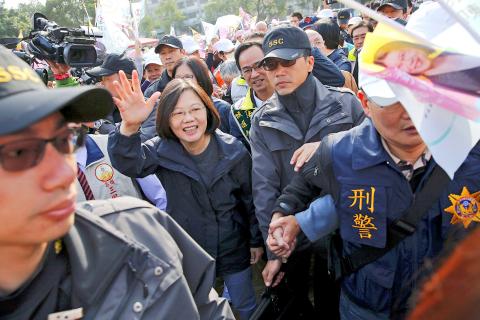Democratic Progressive Party (DPP) presidential candidate Tsai Ing-wen (蔡英文) yesterday reiterated that if she is elected president she would do her best to maintain stability across the Taiwan Strait through diplomatic communication.
“I have made it clear, and said it during the [televised] campaign platform presentation that, once elected, I would immediately start communicating with our diplomatic allies and with China,” Tsai said during a campaign rally in Kaohsiung. “I know that stability across the Taiwan Strait is in our shared interests. I would do my best to maintain that stability.”
Tsai made the remarks in response to reporters’ queries about comments made by Center for Strategic and International Studies senior vice president Michael Green, who said he would help to facilitate cross-strait talks.

Photo: Damir Sagolj, Reuters
Meanwhile, in response to speculation that Tsai might be facing some security threats, the DPP chairperson was also asked if she has stepped up her security efforts, such as wearing a bullet-proof vest. Tsai did not elaborate in detail, but said that she would do as directed by the National Security Bureau.
Tsai was also asked if she was concerned about the number of at-large legislative seats the DPP might win in tomorrow’s election, as some traditional DPP supporters are diverting their votes to smaller parties with similar ideologies, such as the New Power Party and the Green Party-Social Democratic Party Alliance.
She admitted that the outcome might not be as good as she would like.
“Support for our at-large ballot is not looking as good as we expected,” she said. “I hoped that we could convince voters to give us their maximum support, since we have such a good at-large list. We will do our best in the remaining hours to get more people into the legislature.”
At recent rallies, Tsai and other DPP heavyweights have been calling on voters to concentrate their support on the DPP.
Tsai was also asked to comment on recent accusations that she has received illegal political donations totaling NT$450 million (US$13.34 million).
Former Chinese Nationalist Party (KMT) legislator Chiu Yi (邱毅) on Tuesday accused Tsai of receiving donations from former president Chen Shui-bian (陳水扁) via Huang Fang-yen (黃芳彥), the former first family’s physician, who has been accused of playing a role in the family’s corruption.
Chiu alleged that according to a witness surnamed Lin (林), during the New Taipei City mayoral election in 2010 Tsai received NT$50 million from Huang and that the DPP received NT$200 million from Huang during the 2014 nine-in-one elections.
Another NT$200 million was donated to Tsai this year, he added.
“It is yet another baseless accusation. I will ask my lawyer to take care of it,” Tsai said. “There are only two days left before the election; trying to manipulate the election through baseless accusations causes huge damage to democracy, and voters should vote the KMT out if it does not intend to reform.”

Conflict with Taiwan could leave China with “massive economic disruption, catastrophic military losses, significant social unrest, and devastating sanctions,” a US think tank said in a report released on Monday. The German Marshall Fund released a report titled If China Attacks Taiwan: The Consequences for China of “Minor Conflict” and “Major War” Scenarios. The report details the “massive” economic, military, social and international costs to China in the event of a minor conflict or major war with Taiwan, estimating that the Chinese People’s Liberation Army (PLA) could sustain losses of more than half of its active-duty ground forces, including 100,000 troops. Understanding Chinese

The Ministry of Foreign Affairs (MOFA) yesterday said it is closely monitoring developments in Venezuela, and would continue to cooperate with democratic allies and work together for regional and global security, stability, and prosperity. The remarks came after the US on Saturday launched a series of airstrikes in Venezuela and kidnapped Venezuelan President Nicolas Maduro, who was later flown to New York along with his wife. The pair face US charges related to drug trafficking and alleged cooperation with gangs designated as terrorist organizations. Maduro has denied the allegations. The ministry said that it is closely monitoring the political and economic situation

UNRELENTING: China attempted cyberattacks on Taiwan’s critical infrastructure 2.63 million times per day last year, up from 1.23 million in 2023, the NSB said China’s cyberarmy has long engaged in cyberattacks against Taiwan’s critical infrastructure, employing diverse and evolving tactics, the National Security Bureau (NSB) said yesterday, adding that cyberattacks on critical energy infrastructure last year increased 10-fold compared with the previous year. The NSB yesterday released a report titled Analysis on China’s Cyber Threats to Taiwan’s Critical Infrastructure in 2025, outlining the number of cyberattacks, major tactics and hacker groups. Taiwan’s national intelligence community identified a large number of cybersecurity incidents last year, the bureau said in a statement. China’s cyberarmy last year launched an average of 2.63 million intrusion attempts per day targeting Taiwan’s critical

‘SLICING METHOD’: In the event of a blockade, the China Coast Guard would intercept Taiwanese ships while its navy would seek to deter foreign intervention China’s military drills around Taiwan this week signaled potential strategies to cut the nation off from energy supplies and foreign military assistance, a US think tank report said. The Chinese People’s Liberation Army (PLA) conducted what it called “Justice Mission 2025” exercises from Monday to Tuesday in five maritime zones and airspace around Taiwan, calling them a warning to “Taiwanese independence” forces. In a report released on Wednesday, the Institute for the Study of War said the exercises effectively simulated blocking shipping routes to major port cities, including Kaohsiung, Keelung and Hualien. Taiwan would be highly vulnerable under such a blockade, because it